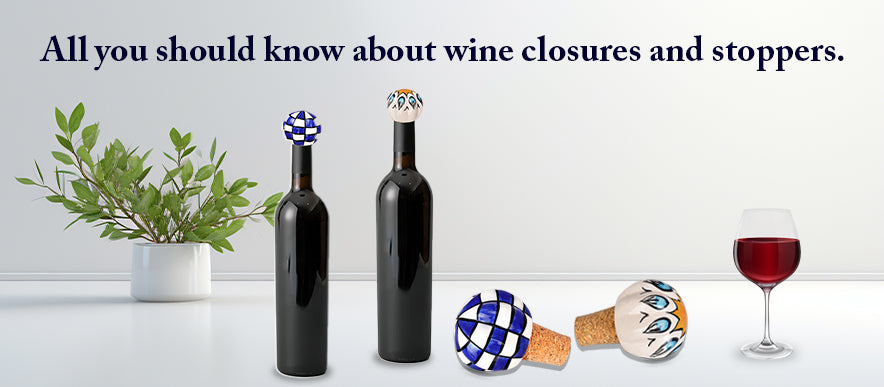Introduction: So Why Do Wine Closures Matter?
Wine is not only a matter of grape varieties, or vintages, or terroir, but also how it is sealed and preserved. The traditional wine cork, the modern screw and the new wine bottle stoppers are all important closures that ensure freshness, flavor and aroma. The right closure and understanding how to store an opened bottle with wine stoppers or a wine bottle sealer can improve your wine experience and save you the needless waste.
Here we will discuss the kind of different closures, the difference between corks and screw caps, the emergence of cork stoppers, and the most appropriate methods of storing unfinished bottles with appropriate bottle stoppers.
Types of Wine Closures

The Classic Choice is Natural Wine Cork
Wine cork is the most famous type of closure, utilized in close to 70 percent of all wine bottles. Cork stoppers are harvested out of cork oak trees and provide only a limited amount of oxygen to the wine, contributing to its complexity in aging. Natural cork also has a prestige attached to it, since many consumers perceive it as quality wine.
But there is a downside to cork. The most notable problem is cork taint that is created by TCA (tri-chloroanisole) and can ruin the smell of the wine. It's a problem that has not been common, but some producers have considered other methods of closure.
Synthetic Corks: Price and Stability
Plastic or plant based polymers are used to make synthetic wine stoppers. They also provide consistency in diffusion between oxygen as compared to natural cork that ages randomly. They are also cheap, resistant to cork taint and durable.
On the negative side, other critics believe that synthetic corks can give the wine delicate chemical aromas. They are also somewhat hard to extract and the process of opening the wine becomes less graceful. Nevertheless, they are used effectively by many mid-range wines.
Screw Caps: Modernity, Meets Convenience

Screw caps have become popular particularly in Australia and New Zealand since their introduction in the 1970s. They are easy to carry, cheap and cork free. Screw top wines stay fresh and can be stored standing in the refrigerator.
The controversy is in the potential of aging. According to some professionals, the screw caps do not help wines to mature as gracefully as the cork closures do. However, when wines are to be consumed in a relatively short period of time, they are a very good option.
How to store your opened wine with wine bottle stoppers
Rubber Wine Stoppers
Rubber wine bottle stoppers are cheap, ornamental and useful. They serve as an alternative to a real wine cork, and are perfect when you have less than a day or a week to complete the bottle. Some are in fun forms which makes them a good present to wine lovers.
Although rubber bottle stoppers do not extend the shelf life of wine, they are convenient when used by an amateur who does not have enough time to re-cork the wine bottle.
Vacuum Pump Stoppers
Vacuum pump wine stoppers are widely used in restaurants and at home. These wine bottle sealers vacuum the bottle and eliminate oxidation, which saves the wine an additional day or two before becoming stale and bitter. They are a little pricier but very useful when it comes to storing in the short-term.
When you prefer drinking a bottle in a duration of a few days, then a vacuum pump wine bottle sealer is a good investment.
Ornamental and Supreme Bottle Stoppers
In addition to functionality, most high-end bottle tops combine functionality with style. These wine stoppers are made of stainless steel, glass or silicone and they also make beautiful additions to your collection. Others are airtight and thus fashionable but useful.
Cork Taint and Its Impact

What Is Cork Taint?
Cork taint is a natural wine cork contamination with TCA that provides wine with a musty, damp, wet-cardboard smell. It is not damaging to health, it destroys the sense experience.
How Common Is It?
Cork taint occurs on approximately 1-3% of wines that are cork sealed. It is not common but it is of much concern to those who collect fine wines.
Cork Taint Prevention by Alternatives
That issue has prompted the creation of plastic wine corks, screw top and premium wine bottle seals that remove the threat but offer a superior preservation capability.
Stores Opened Wine Properly
Re-Corking the Bottle
Reinsertion of the original wine cork to minimize oxygen exposure is advisable should you still have the original wine cork. Where not available, use cork stoppers or silicone bottle stoppers.
Refrigeration of Open Bottles
Irrespective of the type of closure, refrigeration will slow chemical reactions and maintain freshness of wine. A cooler climate is even beneficial to red wine once opened. Best results with pair refrigeration and wine bottle stoppers.
Preservation Systems Wine Preservation Systems
More serious fans would require fancy equipment like an inert gas sealing or Coravin devices to step it up to the more advanced wine bottle sealers. These enable you to pour wine without taking off the cork stoppers, so it will last longer without being oxidized.
Conclusion
Sealed with a wine cork, screw lid, or synthetic substance, any wine was meant to be preserved well once opened. The appropriate selection of wine corks or wine bottle caps will maintain the aroma, flavor, and personality of each pour. There is a rubber bottle top, a vacuum pump system to store wine long enough and a solution to all classes of wine lovers.
Being aware of closures is not only a question of tradition--it is a question of adding to your overall wine experience. With the right choice of wine bottle stoppers and storing techniques you can enjoy every glass like it was the first drink of a new opened bottle. Cheers!
FAQs
1. Do wine bottle stoppers perform better than the initial cork?
Yes, A natural wine cork can be effective but today bottle tops on wine bottles usually offer a tighter seal and also are easier to operate, particularly in the short term.
2. Wine with wine bottle sealer: How many days will it last?
With a vacuum pump wine bottle sealer, the life of the opened wine can be maintained at 3-5 days, depending on the kind of wine.
3. Why are there cork stoppers and synthetic wine stoppers?
Natural cork stoppers help to age the wine, and synthetic wine stoppers are consistent, cheap, and not susceptible to cork taint.
4. Is it possible to store screw-cap wine with bottle stoppers?
Yes, Although screw caps can be resealed, an extra bottle stopper or wine bottle sealer will increase freshness.
5. Do ornamental wine seals keep wine fresh?
Ornamental wine corks are most useful in the short run. To ensure a prolonged preservation, you can use vacuum pumps or wine bottle sealers that are airtight.

